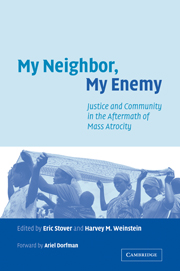Book contents
- Frontmatter
- Contents
- List of contributors
- Foreword by Ariel Dorfman
- Acknowledgments
- Introduction: conflict, justice and reclamation
- Part I Institutional approaches to justice
- Part II Social reconstruction and justice
- Part III Survivors and justice
- Conclusion: a common objective, a universe of alternatives
- Index
Foreword by Ariel Dorfman
Published online by Cambridge University Press: 05 May 2010
- Frontmatter
- Contents
- List of contributors
- Foreword by Ariel Dorfman
- Acknowledgments
- Introduction: conflict, justice and reclamation
- Part I Institutional approaches to justice
- Part II Social reconstruction and justice
- Part III Survivors and justice
- Conclusion: a common objective, a universe of alternatives
- Index
Summary
It is comforting to watch the trials afterwards.
After the bombs and the machetes. After the war of brother against brother and neighbor against neighbor. After the torn bodies and the burnt-out villages. After the faces of grief and the faces of those who are so beyond grief they cannot speak and cannot cry. After the children blown up or hacked to death. After the rubble and the fires.
After all of this and too much more, so much more than anybody should be expected to witness, let alone live, yes, it is comforting to hear about, see from time to time, the trial of the man, some of the men, held responsible for any one of these outrages against humanity.
Comforting to watch the accusations, the evidence, the witnesses.
Justice is being done, punishment will be meted out, a balance has been redressed to a universe gone mad.
I am one of those who has been consoled and moved by those exemplary rituals of the law during which violators of human rights are forced to accept and obey the rules, the very civilized behavior, they have so pitilessly flouted. I have been among those who proclaim how urgent and necessary such proceedings are for the well-being of our wounded humanity. Important for the victims, instructive for the victimizers, healthy for the community that was damaged, and deeply satisfying for those who watched from far away and could do nothing to stop the horror.
- Type
- Chapter
- Information
- My Neighbor, My EnemyJustice and Community in the Aftermath of Mass Atrocity, pp. xiii - xvPublisher: Cambridge University PressPrint publication year: 2004



